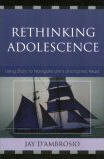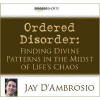
Meredith was a high school sophomore who went out for the summer league swim team. She was an incredibly hard worker who gave 110 percent to each workout. Her swim coach, Ms. Nida, liked Meredith right away and, as her coach, naturally wanted her to experience success in the pool. If we look deep enough into anyone’s eyes, we will see the smoke from a battle raging within. It was no different with this young lady. You see, Meredith had been labeled a “choker,” meaning that she swam well in practice, but when it came time to perform in a swim meet, she always seemed to come up short.
Meredith’s swim team, the Lake Shore Sharks, was preparing to swim against one of their strongest summer league rivals, the Kahkwa Cruisers. Both the boys and girls teams were excited and nervous about the annual swim meet. The week prior to the event, they turned their excess energy into making signs and slogan-bearing T-shirts and a lot of splashing and hollering. This swim meet was the highlight of the year! The 200-meter freestyle relay was the most anticipated event of the meet. All the swimmers waited anxiously to see whom the coaches would choose to enter in the relay.

Ms. Nida decided that this was the right time to intervene in Meredith’s story. The relay assignments would not be posted until the day of the swim meet, but she had a chance to speak with Meredith the prior to the race. She told her that she was so pleased with her work ethic in practice and that it was time for that effort to produce some results. Ms. Nida let her know that she had the “right stuff” to be a champion. These were words Meredith had heard before, but this time the coach went a step further. She gave her a quest, her own Gorgon to slay. Well, maybe not a literal monster, but a hobgoblin of the heart, which is no less terrifying. Ms. Nida told her that she had decided to give her the coveted anchor position on the girls’ 18-and-under relay.
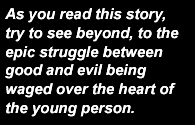
The blood drained from Meredith’s face. It was indeed a gift, but she didn’t see it as such . . . yet. The lies of the villain Meredith had believed about herself began to flow out of her mouth like water. “I’m a choker! The other girls will hate me if I don’t win it for them! I can’t do it!” But her coach simply said, “Meredith, I believe you can.”
Meredith didn’t get much sleep that night, thinking about her race the next day. Finally, the day arrived. Banners, crowds, cheers, and nerves filled the natatorium. As they headed into the final relays, the pressure was on! When Meredith stepped onto the starting block to anchor the 200 freestyle relay, the cheers erupted. Her heart was racing!

Did Meredith win in a close race allowing Lake Shore to prevail? No. This story didn’t end with a win. Quite the contrary, Kahkwa beat Lake Shore handily. However, a victory was secured that probably went undetected by most. Meredith swam her heart out! She didn’t choke. They didn’t win the race, but Meredith swam the fastest time of her life! People must have thought it strange that day to see Ms. Nida, the swim coach, jumping up and down with excitement on the pool deck as the team was losing to its rival. She was cheering for a team member who didn’t even win the blue ribbon!
Despite what some parents and coaches might say, youth sports aren’t about winning; they’re about building character and heart. The battles for the heart are often subtly won or lost, like the marathon runner who places 127th, but finishes the race. Meredith’s Medusa was slain that day; she just needed the gift of the magical sword with which to dispatch the hideous monster. In this case the sword was the anchor position on the girls’ relay team. Her new identity began to form as one who could come through when it counts. She was no longer the choker.
Labels: anchor, choker, country club, freestyle, gifts, hobgoblin, Kakhwa, Lake Shore, Meredith, monster, Nida, practice, relay, story, swim team, swimmer
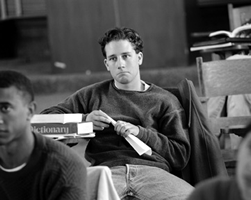 Just as the gods noticed the tears of Odysseus, we as adult leaders need to be aware of changes in our students’ behavior. Is a normally happy and upbeat girl now depressed and teary-eyed? Is a boy who is normally talkative suddenly quiet? Is an easygoing student becoming touchy and irritable? Granted, there could be many reasons for such a change, but pay attention to who it is they are spending time with.
Just as the gods noticed the tears of Odysseus, we as adult leaders need to be aware of changes in our students’ behavior. Is a normally happy and upbeat girl now depressed and teary-eyed? Is a boy who is normally talkative suddenly quiet? Is an easygoing student becoming touchy and irritable? Granted, there could be many reasons for such a change, but pay attention to who it is they are spending time with. Odysseus, drifting in an endless sea of despair, washed ashore on an unknown island. All he understood was that his face was against the rough, grainy sand of a beach, and that he was for the moment safe from Poseidon’s apparently unyielding wrath. His vision skewed due to lack of sleep and his taxing ordeal, he came upon a shimmering apparition. He asked this strange being where he had landed. With voice enticing, she assured him that he was now home. Feeling the hope arise in his heart, the hero supposed that he had arrived in Ithaca; however, he was very much mistaken, for he had actually landed on the island of the sea nymph, Calypso.
Odysseus, drifting in an endless sea of despair, washed ashore on an unknown island. All he understood was that his face was against the rough, grainy sand of a beach, and that he was for the moment safe from Poseidon’s apparently unyielding wrath. His vision skewed due to lack of sleep and his taxing ordeal, he came upon a shimmering apparition. He asked this strange being where he had landed. With voice enticing, she assured him that he was now home. Feeling the hope arise in his heart, the hero supposed that he had arrived in Ithaca; however, he was very much mistaken, for he had actually landed on the island of the sea nymph, Calypso.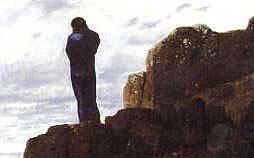 Homer tells us that this intoxicating divinity had fallen in love with the mortal Odysseus. The poet gives us no indication that this love wasn’t the real thing. Calypso passionately loved Odysseus. Nonetheless, he knew that his fate lay along another path. His heart's longing was for his true home and for his family. The sea nymph’s tidal passion for Odysseus caused her to, in essence, imprison him on her island. Being battered and faint from his horrendous trials, the hero collapsed into the loving embrace of Calypso.
Homer tells us that this intoxicating divinity had fallen in love with the mortal Odysseus. The poet gives us no indication that this love wasn’t the real thing. Calypso passionately loved Odysseus. Nonetheless, he knew that his fate lay along another path. His heart's longing was for his true home and for his family. The sea nymph’s tidal passion for Odysseus caused her to, in essence, imprison him on her island. Being battered and faint from his horrendous trials, the hero collapsed into the loving embrace of Calypso.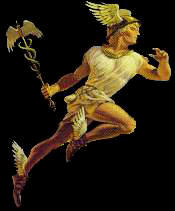 The gods of Olympus heard the cries of the hero-king and, considering his destiny, sent the messenger-god to the island prison. Hermes came to Calypso and relayed the will of Zeus. He declared that Odysseus was to be set free from the bonds of this island and was to be permitted to continue his quest. Embittered by this word from on high, Calypso protested. Finally, Hermes warned the goddess that dire consequences drive her island to the bottom of Poseidon's sea if she insisted on keeping Odysseus captive. Calypso relented at last, and Odysseus was free to journey on!
The gods of Olympus heard the cries of the hero-king and, considering his destiny, sent the messenger-god to the island prison. Hermes came to Calypso and relayed the will of Zeus. He declared that Odysseus was to be set free from the bonds of this island and was to be permitted to continue his quest. Embittered by this word from on high, Calypso protested. Finally, Hermes warned the goddess that dire consequences drive her island to the bottom of Poseidon's sea if she insisted on keeping Odysseus captive. Calypso relented at last, and Odysseus was free to journey on!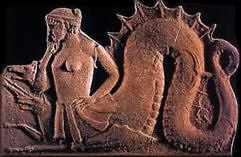 Odysseus, on his long journey home to his wife Penelope and son Telemachus, had survived the terrors of a hideous monster, Scylla, who devoured many of his crew in the shadows of a narrow sea passage. The blind prophet Teiresias had warned the mighty hero of the dangers of this terrible foe, but desiring home more than fearing for his life, Odysseus chanced the terrors of Scylla. He and his men courageously sailed through the narrow, rocky passage where she lurked in the shadows. In a few awful moments, the multiheaded Scylla tore the sailors to pieces with gnashing, razorlike teeth, and one by one devoured the bloody remains. Watching in helpless horror, Odysseus and the few men left rowed with all their might, fleeing the fearsome monster.
Odysseus, on his long journey home to his wife Penelope and son Telemachus, had survived the terrors of a hideous monster, Scylla, who devoured many of his crew in the shadows of a narrow sea passage. The blind prophet Teiresias had warned the mighty hero of the dangers of this terrible foe, but desiring home more than fearing for his life, Odysseus chanced the terrors of Scylla. He and his men courageously sailed through the narrow, rocky passage where she lurked in the shadows. In a few awful moments, the multiheaded Scylla tore the sailors to pieces with gnashing, razorlike teeth, and one by one devoured the bloody remains. Watching in helpless horror, Odysseus and the few men left rowed with all their might, fleeing the fearsome monster. Not many adolescents have had encounters with mythological monsters like Scylla and Charybdis. However, considering the formidable experiences they have faced heretofore, one could contend that they are nearly equivalent to the horrors that confronted Odysseus. While the students may not have stared into the daggerlike teeth of Scylla, there are those who have been abused physically, emotionally, and sexually. None of them have been drowned in the powerful whirling waters of Charybdis, but there are those who have drowned in the overpowering expectations and demands of parents and friends. Many students have encountered monsters just as ghastly as those described in Homer’s epic. Where do they turn for solace and shelter from the storm? Where did Odysseus turn?
Not many adolescents have had encounters with mythological monsters like Scylla and Charybdis. However, considering the formidable experiences they have faced heretofore, one could contend that they are nearly equivalent to the horrors that confronted Odysseus. While the students may not have stared into the daggerlike teeth of Scylla, there are those who have been abused physically, emotionally, and sexually. None of them have been drowned in the powerful whirling waters of Charybdis, but there are those who have drowned in the overpowering expectations and demands of parents and friends. Many students have encountered monsters just as ghastly as those described in Homer’s epic. Where do they turn for solace and shelter from the storm? Where did Odysseus turn? Teens today have been wounded in a variety of ways. They are hurting. Outwardly, things may seem fine, but below the waters, there is a immense private suffering. Look at our society. What is put forth as the solution to our problems and our pain? It's romantic love, isn't it? Watch a few TV shows. The shows aimed at young people portray the main character trying to get a boyfriend or girlfriend. No doubt, it can be entertaining, but it won’t make things right in the world. Commercials communicate the same message. “Wear this deodorant and you’ll have to fight the girls off!” “Try this shampoo and the boys will flock to your side!” There are so many messages in our culture that sear the idea into the minds of adolescents that if you find the right person, it will make everything all right.
Teens today have been wounded in a variety of ways. They are hurting. Outwardly, things may seem fine, but below the waters, there is a immense private suffering. Look at our society. What is put forth as the solution to our problems and our pain? It's romantic love, isn't it? Watch a few TV shows. The shows aimed at young people portray the main character trying to get a boyfriend or girlfriend. No doubt, it can be entertaining, but it won’t make things right in the world. Commercials communicate the same message. “Wear this deodorant and you’ll have to fight the girls off!” “Try this shampoo and the boys will flock to your side!” There are so many messages in our culture that sear the idea into the minds of adolescents that if you find the right person, it will make everything all right. Whenever we have something set upon our heart to do, we feel a rush of excitement. We feel refreshed, "At last, this is the thing I was meant to do!" But, the voices of doubt slowly creep in. "This is too big for me." "I couldn't possibly do something like this." "Nobody would want to listen to what I have to say." "What would others think?" Whatever the voices say, remember that the enemy would love to shred your dreams and visions before they can even take root. What is in your heart is a threat to him.
Whenever we have something set upon our heart to do, we feel a rush of excitement. We feel refreshed, "At last, this is the thing I was meant to do!" But, the voices of doubt slowly creep in. "This is too big for me." "I couldn't possibly do something like this." "Nobody would want to listen to what I have to say." "What would others think?" Whatever the voices say, remember that the enemy would love to shred your dreams and visions before they can even take root. What is in your heart is a threat to him. 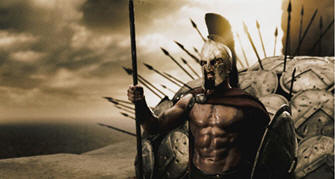 I just returned from watching the movie 300. The visuals were stunning and the violence, graphic. For those of you who know your history, you remember that in 480 B.C. the Persian king, Xerxes, set out with tens upon thousands of troops to conquer the free city-states of Greece, including Athens and Sparta. Three hundred Spartans, under the command of Leonidas, stood in the gap between the Persian hordes and the unprepared Greek peoples. Resisting wave after wave of Persian onslaught, the Spartans held the narrow pass of Thermopylae for days, allowing the rest of Greece to prepare for battle. They were ultimately defeated, by an act of betrayal, but their valiant stand enabled the Athenian navy to defeat the Persian fleet at Salamis.
I just returned from watching the movie 300. The visuals were stunning and the violence, graphic. For those of you who know your history, you remember that in 480 B.C. the Persian king, Xerxes, set out with tens upon thousands of troops to conquer the free city-states of Greece, including Athens and Sparta. Three hundred Spartans, under the command of Leonidas, stood in the gap between the Persian hordes and the unprepared Greek peoples. Resisting wave after wave of Persian onslaught, the Spartans held the narrow pass of Thermopylae for days, allowing the rest of Greece to prepare for battle. They were ultimately defeated, by an act of betrayal, but their valiant stand enabled the Athenian navy to defeat the Persian fleet at Salamis. 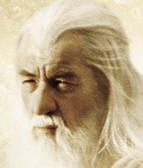 Remember, your actions—no matter how affirming and strong—will not end the trials and tribulations that the adolescents in our lives must endure, but they will go a long way toward helping them establish a healthy identity and sense of self-worth. As Gandalf, the wise wizard in Tolkien’s Lord of the Rings, so eloquently said:
Remember, your actions—no matter how affirming and strong—will not end the trials and tribulations that the adolescents in our lives must endure, but they will go a long way toward helping them establish a healthy identity and sense of self-worth. As Gandalf, the wise wizard in Tolkien’s Lord of the Rings, so eloquently said: The mythical pattern encourages us, as authority figures, not only to affirm and encourage the young with our words but also to present them with a concrete demonstration that we actually believe what we are saying about them. This is the gift. As Menelaus gave Telemachus a priceless silver bowl handcrafted by the gods and Obi-Wan gave Luke his father’s light saber, so too must we give a gift that expresses the reality of our words. What gifts do you have to give the students in your life? Oftentimes, the gift can be an opportunity, similar to the opportunity adult leaders gave to Manuel, Jordan, and Meredith. Other times, it can be a literal, physical present.
The mythical pattern encourages us, as authority figures, not only to affirm and encourage the young with our words but also to present them with a concrete demonstration that we actually believe what we are saying about them. This is the gift. As Menelaus gave Telemachus a priceless silver bowl handcrafted by the gods and Obi-Wan gave Luke his father’s light saber, so too must we give a gift that expresses the reality of our words. What gifts do you have to give the students in your life? Oftentimes, the gift can be an opportunity, similar to the opportunity adult leaders gave to Manuel, Jordan, and Meredith. Other times, it can be a literal, physical present. I had the privilege of mentoring a young man, a high school senior, who had unfortunately managed to get into a great deal of trouble. His father was active in his life and wanted to be a part of the mentoring process whenever possible. As the boy made progress throughout the year and became accountable for his actions, his relationship with his father improved. Throughout his mentoring sessions, his father affirmed the good and noble characteristics that he observed in his son’s life. Though a frequently painful process, the young man began to make significant strides. Upon his graduation from high school, his father presented him with a gift that blew him away! He gave his son an actual sword, a real Scottish Claymore like the one William Wallace used in the movie Braveheart (1995). With this gift, the young man knew that his father actually believed that he could be trusted with something dangerous. He was trustworthy.
I had the privilege of mentoring a young man, a high school senior, who had unfortunately managed to get into a great deal of trouble. His father was active in his life and wanted to be a part of the mentoring process whenever possible. As the boy made progress throughout the year and became accountable for his actions, his relationship with his father improved. Throughout his mentoring sessions, his father affirmed the good and noble characteristics that he observed in his son’s life. Though a frequently painful process, the young man began to make significant strides. Upon his graduation from high school, his father presented him with a gift that blew him away! He gave his son an actual sword, a real Scottish Claymore like the one William Wallace used in the movie Braveheart (1995). With this gift, the young man knew that his father actually believed that he could be trusted with something dangerous. He was trustworthy. 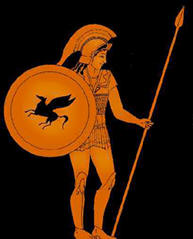 Look for opportunities to affirm the good qualities of the students in your circle. Remember that your words are more powerful than you will ever know! Some students will make it more challenging than others to find positive qualities, but don’t give up! Look for what they could be, not what they are right now. Keep in mind that adolescents are often unable to see those traits in themselves. Discover those positive characteristics and call attention to them!
Look for opportunities to affirm the good qualities of the students in your circle. Remember that your words are more powerful than you will ever know! Some students will make it more challenging than others to find positive qualities, but don’t give up! Look for what they could be, not what they are right now. Keep in mind that adolescents are often unable to see those traits in themselves. Discover those positive characteristics and call attention to them! Bruce Feiler, host of PBS's Walking the Bible miniseries, eloquently reflected that, "Some journeys we choose to go on...some journeys choose us." It's probably truer than most of us realize. Which journeys in your life have you felt an urge to begin? Which journeys have chosen you?
Bruce Feiler, host of PBS's Walking the Bible miniseries, eloquently reflected that, "Some journeys we choose to go on...some journeys choose us." It's probably truer than most of us realize. Which journeys in your life have you felt an urge to begin? Which journeys have chosen you?  Adolescents will often begin to see the things that we identify in them. If we point out a liar, a thief, a failure, or a drain on society, they will tend to follow that lead and begin to believe those things about themselves. On the other hand, if you see an adolescent who has the potential to be an honest person, someone who is capable of being trustworthy, or one who could possibly make a significant contribution to the world—and you tell them about it—they are much more likely to see those good characteristics in themselves. Someone once said that the word potential simply means “they haven’t done it yet.” In a sense, that’s true. That is why it is important to follow the mythical pattern we’ve been examining. A gift or task always follows the affirmation. Give students an opportunity to work out that potential in their own lives. Tremendous things have humble beginnings. It is a reoccurring theme in the cosmos. Remember the Big Bang!
Adolescents will often begin to see the things that we identify in them. If we point out a liar, a thief, a failure, or a drain on society, they will tend to follow that lead and begin to believe those things about themselves. On the other hand, if you see an adolescent who has the potential to be an honest person, someone who is capable of being trustworthy, or one who could possibly make a significant contribution to the world—and you tell them about it—they are much more likely to see those good characteristics in themselves. Someone once said that the word potential simply means “they haven’t done it yet.” In a sense, that’s true. That is why it is important to follow the mythical pattern we’ve been examining. A gift or task always follows the affirmation. Give students an opportunity to work out that potential in their own lives. Tremendous things have humble beginnings. It is a reoccurring theme in the cosmos. Remember the Big Bang! Meredith was a high school sophomore who went out for the summer league swim team. She was an incredibly hard worker who gave 110 percent to each workout. Her swim coach, Ms. Nida, liked Meredith right away and, as her coach, naturally wanted her to experience success in the pool. If we look deep enough into anyone’s eyes, we will see the smoke from a battle raging within. It was no different with this young lady. You see, Meredith had been labeled a “choker,” meaning that she swam well in practice, but when it came time to perform in a swim meet, she always seemed to come up short.
Meredith was a high school sophomore who went out for the summer league swim team. She was an incredibly hard worker who gave 110 percent to each workout. Her swim coach, Ms. Nida, liked Meredith right away and, as her coach, naturally wanted her to experience success in the pool. If we look deep enough into anyone’s eyes, we will see the smoke from a battle raging within. It was no different with this young lady. You see, Meredith had been labeled a “choker,” meaning that she swam well in practice, but when it came time to perform in a swim meet, she always seemed to come up short. Ms. Nida decided that this was the right time to intervene in Meredith’s story. The relay assignments would not be posted until the day of the swim meet, but she had a chance to speak with Meredith the prior to the race. She told her that she was so pleased with her work ethic in practice and that it was time for that effort to produce some results. Ms. Nida let her know that she had the “right stuff” to be a champion. These were words Meredith had heard before, but this time the coach went a step further. She gave her a quest, her own Gorgon to slay. Well, maybe not a literal monster, but a hobgoblin of the heart, which is no less terrifying. Ms. Nida told her that she had decided to give her the coveted anchor position on the girls’ 18-and-under relay.
Ms. Nida decided that this was the right time to intervene in Meredith’s story. The relay assignments would not be posted until the day of the swim meet, but she had a chance to speak with Meredith the prior to the race. She told her that she was so pleased with her work ethic in practice and that it was time for that effort to produce some results. Ms. Nida let her know that she had the “right stuff” to be a champion. These were words Meredith had heard before, but this time the coach went a step further. She gave her a quest, her own Gorgon to slay. Well, maybe not a literal monster, but a hobgoblin of the heart, which is no less terrifying. Ms. Nida told her that she had decided to give her the coveted anchor position on the girls’ 18-and-under relay. The blood drained from Meredith’s face. It was indeed a gift, but she didn’t see it as such . . . yet. The lies of the villain Meredith had believed about herself began to flow out of her mouth like water. “I’m a choker! The other girls will hate me if I don’t win it for them! I can’t do it!” But her coach simply said, “Meredith, I believe you can.”
The blood drained from Meredith’s face. It was indeed a gift, but she didn’t see it as such . . . yet. The lies of the villain Meredith had believed about herself began to flow out of her mouth like water. “I’m a choker! The other girls will hate me if I don’t win it for them! I can’t do it!” But her coach simply said, “Meredith, I believe you can.” Did Meredith win in a close race allowing Lake Shore to prevail? No. This story didn’t end with a win. Quite the contrary, Kahkwa beat Lake Shore handily. However, a victory was secured that probably went undetected by most. Meredith swam her heart out! She didn’t choke. They didn’t win the race, but Meredith swam the fastest time of her life! People must have thought it strange that day to see Ms. Nida, the swim coach, jumping up and down with excitement on the pool deck as the team was losing to its rival. She was cheering for a team member who didn’t even win the blue ribbon!
Did Meredith win in a close race allowing Lake Shore to prevail? No. This story didn’t end with a win. Quite the contrary, Kahkwa beat Lake Shore handily. However, a victory was secured that probably went undetected by most. Meredith swam her heart out! She didn’t choke. They didn’t win the race, but Meredith swam the fastest time of her life! People must have thought it strange that day to see Ms. Nida, the swim coach, jumping up and down with excitement on the pool deck as the team was losing to its rival. She was cheering for a team member who didn’t even win the blue ribbon! This morning, Joel Osteen delivered a message about doing the things in life that set in your heart. There are all sorts of powers that will set themselves against you when you set out to live your dreams, things which will test your resolve and shake you to the core.
This morning, Joel Osteen delivered a message about doing the things in life that set in your heart. There are all sorts of powers that will set themselves against you when you set out to live your dreams, things which will test your resolve and shake you to the core. 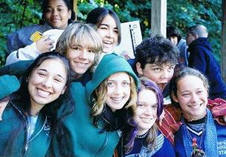 A few years earlier, a youth worker named Siofra had had the opportunity to come in contact with a young lady who was going into her junior year of high school. She was attending a camp known as the Gateway Teen Institute, where Siofra was working as a summer counselor. The girl’s name was Jordan, and Siofra could tell from her actions that she would rather have been invisible. She was quiet, the sort of kid that tends to fly under the radar, the kind that adult leaders often overlook.
A few years earlier, a youth worker named Siofra had had the opportunity to come in contact with a young lady who was going into her junior year of high school. She was attending a camp known as the Gateway Teen Institute, where Siofra was working as a summer counselor. The girl’s name was Jordan, and Siofra could tell from her actions that she would rather have been invisible. She was quiet, the sort of kid that tends to fly under the radar, the kind that adult leaders often overlook.

